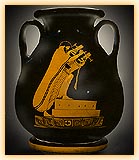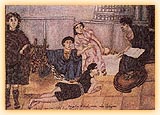 |
| No other work of world literature has caused so much controversy over the centuries
as the Iliad and Odyssey. Already from antiquity there were many
disputes -with first and foremost among them the authorship of the two epics and
the person of Homer. Even though for ancient Greeks there was no doubt
that Homer had existed, their views were diverging as to the period in which he had lived, his birthplace
and the extent of the poems he himself had composed. Herodotus believed
that Homer had lived approximately four hundred years before himself, that is at the end of
the 9th century BC. There does exist an epigram according to which seven cities, "Smyrna, Chios, Colophon, Ithaca, Pylos, Argos, Athens", claimed
to be the birthplace of Homer.
The initially Aeolian Smyrna -which subsequently became Ionian- and Chios
have the most supporters to this day. |
 Since antiquity the view has been expressed that the two poems are the work of two
different poets. The so-called 'Separaters', claimed that only the Iliad was the original work of Homer.
This view was supported by many scholars of the 19th century. However,
modern research tends to stress anew their similarities and most differences
are attributed to the different subject-matter of the two poems. In any case, however,
stylistic and linguistic differences can be safely interpreted as a development
in the style of the same poet. The Iliad must have been the work of his youth
-and for this reason more conservative and following closely upon the traditional
heroic poetry- while the innovative and refined Odyssey must have been composed towards the
end of his life.
Since antiquity the view has been expressed that the two poems are the work of two
different poets. The so-called 'Separaters', claimed that only the Iliad was the original work of Homer.
This view was supported by many scholars of the 19th century. However,
modern research tends to stress anew their similarities and most differences
are attributed to the different subject-matter of the two poems. In any case, however,
stylistic and linguistic differences can be safely interpreted as a development
in the style of the same poet. The Iliad must have been the work of his youth
-and for this reason more conservative and following closely upon the traditional
heroic poetry- while the innovative and refined Odyssey must have been composed towards the
end of his life.
|
| The dispute over the epics and Homer was revived after the Renaissance in the West
and culminated in the second half of the 19th and the first half of the 20th centuries.
The juxtaposition acquired such dimensions, that the expression "Homeric problem"
came to denote a long and unresolved dispute. Recent research demonstrated
the need to take under consideration a series of other factors to which
epic poetry is related. These are, for instance, the social institutions that made possible the
creation and preservation of the Homeric poems. Recent studies stress the panhellenic
character of the poems, that might be intended only for the public, swarming from all parts of Greece
to the great festivals, such as that of Olympia. |
 Another
factor which undoubtedly contributed to the consolidation of the form of
the epics and their preservation was the use of writing. With its assistance,
a charismatic poet managed to organize the rich material of the earlier epic tradition.
There are two different views concerning the period in which this occurred. According to the
former, Homer lived in the period when writing emerged for the first time
-around 800 BC- and being himself illiterate dictated his works to
a literate person. According to the latter, the form of the poems which came down
to us was shaped around 700 BC and therefore the poet who fused various epic poems
was a contemporary of Hesiod. Another
factor which undoubtedly contributed to the consolidation of the form of
the epics and their preservation was the use of writing. With its assistance,
a charismatic poet managed to organize the rich material of the earlier epic tradition.
There are two different views concerning the period in which this occurred. According to the
former, Homer lived in the period when writing emerged for the first time
-around 800 BC- and being himself illiterate dictated his works to
a literate person. According to the latter, the form of the poems which came down
to us was shaped around 700 BC and therefore the poet who fused various epic poems
was a contemporary of Hesiod. |
| Over the last years, studies have been under way into the development of mnemonics
which closely relate the form with the content of the epics. Their outcome -still uncertain-
might prove decisive for our concepts concerning oral tradition and individual
literary output. |

 Since antiquity the view has been expressed that the two poems are the work of two
different poets. The so-called 'Separaters', claimed that only the Iliad was the original work of Homer.
This view was supported by many scholars of the 19th century. However,
modern research tends to stress anew their similarities and most differences
are attributed to the different subject-matter of the two poems. In any case, however,
stylistic and linguistic differences can be safely interpreted as a development
in the style of the same poet. The Iliad must have been the work of his youth
-and for this reason more conservative and following closely upon the traditional
heroic poetry- while the innovative and refined Odyssey must have been composed towards the
end of his life.
Since antiquity the view has been expressed that the two poems are the work of two
different poets. The so-called 'Separaters', claimed that only the Iliad was the original work of Homer.
This view was supported by many scholars of the 19th century. However,
modern research tends to stress anew their similarities and most differences
are attributed to the different subject-matter of the two poems. In any case, however,
stylistic and linguistic differences can be safely interpreted as a development
in the style of the same poet. The Iliad must have been the work of his youth
-and for this reason more conservative and following closely upon the traditional
heroic poetry- while the innovative and refined Odyssey must have been composed towards the
end of his life.
 Another
factor which undoubtedly contributed to the consolidation of the form of
the epics and their preservation was the use of writing. With its assistance,
a charismatic poet managed to organize the rich material of the earlier epic tradition.
There are two different views concerning the period in which this occurred. According to the
former, Homer lived in the period when writing emerged for the first time
-around 800 BC- and being himself illiterate dictated his works to
a literate person. According to the latter, the form of the poems which came down
to us was shaped around 700 BC and therefore the poet who fused various epic poems
was a contemporary of Hesiod.
Another
factor which undoubtedly contributed to the consolidation of the form of
the epics and their preservation was the use of writing. With its assistance,
a charismatic poet managed to organize the rich material of the earlier epic tradition.
There are two different views concerning the period in which this occurred. According to the
former, Homer lived in the period when writing emerged for the first time
-around 800 BC- and being himself illiterate dictated his works to
a literate person. According to the latter, the form of the poems which came down
to us was shaped around 700 BC and therefore the poet who fused various epic poems
was a contemporary of Hesiod.